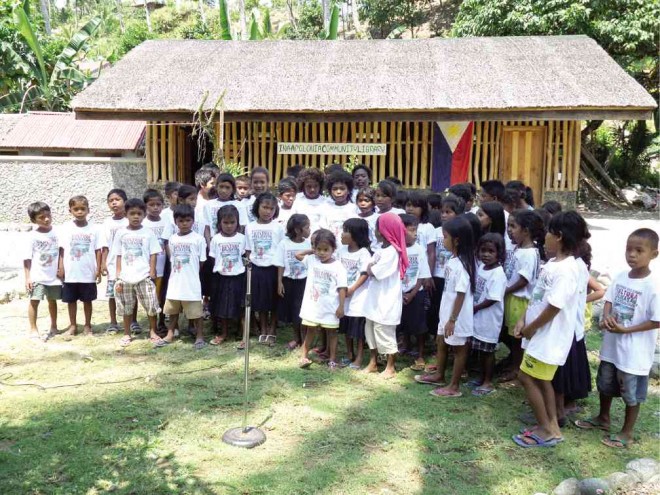Photos by Linda B. Bolido
Like most Filipinos, the Dumagat of General Nakar in Quezon province also look to education to escape a life of poverty.
But getting at least a basic education has not been easy for the ethnic community. Schools are not readily accessible to the upland-dwelling
Dumagat, described by some experts as belonging to the
negroid indigenous peoples (IP) of the Philippines like the Agta and Aeta in other parts of the country.
The Dumagat’s distinctive appearance—skin darker in color than lowland Filipinos and with kinky hair—makes them stand out and objects of ridicule and bullying in school.
One Dumagat elder in sitio Masla said in Filipino, “My granddaughter (who finished high school) had her hair straightened to look more like a lowlander hoping it would improve her chances of getting a college scholarship.”
In 2011, the Lyceum of the Philippines University (LPU), through its Community Outreach and Service Learning Center (Cosel), initiated a comprehensive program for IP education to help Masla’s Dumagat realize their dream of getting an education.
LPU president Roberto P. Laurel, who inaugurated recently the Dumagat Ecolodge at the school site, said that when the Masla outreach program was proposed, “I thought it was too far. There were many areas that were nearer and easier to access. But [I realized the] IPs were not getting enough attention. The project is unique and pioneering.”
With initial support from the Australian Agency for International Development, through the Department of Education (DepEd) and the National Commission on Indigenous Peoples, LPU opened the Katutubong Paaralan ng Jose P. Laurel (KPJPL) as an extension of Sablang Elementary School. The salaries of the teachers are shouldered by the General Nakar municipal government.
DepEd recognition
Starting with Kindergarten and Grade 1, KPJPL now has a Grade 3 class and will start Grade 4 next year. It has also become the first and only katutubo (indigenous) school recognized by the DepEd.
Marilyn L. Ngales, Cosel director, said it was really the IP community that pushed for the opening of the school. Although Masla is still too far for many Dumagat, it is more accessible than the main school and other prospective sites which, Ngales said, would require days to reach.
The location also made it easier for Manila-based LPU teams, not just the Cosel people, to visit constantly for outreach work.
Ngales said no other university within the National Capital Region had a comprehensive program for IP education. She said LPU, in keeping with founder Jose P. Laurel’s commitment to promote social justice and nationalism, had championed the disadvantaged or marginalized groups like indigenous peoples, particularly through education and other basic services.
The Dumagat community in General Nakar offered
6 hectares from their ancestral domain where LPU could help build a school for their children. Laurel said the lot was bigger than the LPU Manila or Cavite campus that they could probably start developing a Masla LPU campus.
While schools in most parts of the country use the mother tongue as medium of instruction, in Masla the Dumagat language started more as a language subject.
Volunteer Nelsie Macale said only a few of the young locals still speak the Dumagat tongue. Most are now Tagalog-speakers.
KPJPL asked volunteers to help teach the local language to preserve, if not revive, it.
Teacher Ruel Villareal said that as the children relearned their mother tongue, they became less shy and more able to express themselves.
Parents, on the other hand, became more actively involved in their kids’ education.
With the use of the mother tongue, volunteer teachers said, learning became easier for the children.
The Masla project has other facets under the more comprehensive DEEP (Dumagat Empowerment for the Elimination of Poverty) initiative.
As Ngales said in a project document, “IP education not only looks at the schoolchildren as its target but also adults [as they] cannot work independently … education and livelihood will have to be supported together.”
The new Ecolodge, which can accommodate as many as 100, will likely be a multipurpose center that will be the hub for livelihood training projects, like community-based ecotourism, conducted by LPU’s various units.
It is also expected to be made available to the local government, DepEd and other groups as a meeting venue, which can bring supplementary funds to community projects.
The Dumagat provided the wood and stones, as well as the labor, for the construction of the two-story building. LPU paid for the other materials and the facilities.
Laurel thanked the Dumagat for giving LPU a truly “meaningful and substantive outreach project,” as he assured them of LPU’s and the Laurel family’s continued support.
Community leader Cristobal U. Azcarraga said that after a long journey, the Dumagat were finally seeing a more progressive community.
As for what the Dumagat could look forward to after basic education, Rosario Ruzol, municipal administrator and sister-in-law of Mayor Leo Ruzol, said the local government had a P4.5 million budget for katutubo college scholarships, which nobody had availed of so far.
According to Ruzol, applicants do not have to take an examination and, definitely, do not have to change their looks to qualify for the scholarship.
